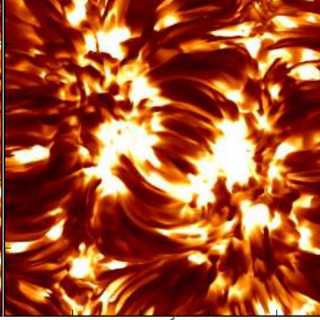Bibcode
DOI
Lites, B. W.; Kubo, M.; Socas-Navarro, H.; Berger, T.; Frank, Z.; Shine, R.; Tarbell, T.; Title, A.; Ichimoto, K.; Katsukawa, Y.; Tsuneta, S.; Suematsu, Y.; Shimizu, T.; Nagata, S.
Referencia bibliográfica
The Astrophysical Journal, Volume 672, Issue 2, pp. 1237-1253.
Fecha de publicación:
1
2008
Revista
Número de citas
413
Número de citas referidas
323
Descripción
Observations of very quiet Sun using the Solar Optical
Telescope/Spectro-Polarimeter (SOT/SP) aboard the Hinode spacecraft
reveal that the quiet internetwork regions are pervaded by horizontal
magnetic flux. The spatial average horizontal apparent flux density
derived from wavelength-integrated measures of Zeeman-induced linear
polarization is BTapp=55 Mx cm-2, as
compared to the corresponding average vertical apparent flux density of
|BLapp|=11 Mx cm-2. Distributions of
apparent flux density are presented. Magnetic fields are organized on
mesogranular scales, with both horizontal and vertical fields showing
``voids'' of reduced flux density of a few granules spatial extent. The
vertical fields are concentrated in the intergranular lanes, whereas the
stronger horizontal fields are somewhat separated spatially from the
vertical fields and occur most commonly at the edges of the bright
granules. High-S/N observations from disk center to the limb help to
constrain possible causes of the apparent imbalance between
|BLapp| and BTapp, with
unresolved structures of linear dimension on the surface smaller by at
least a factor of 2 relative to the SOT/SP angular resolution being one
likely cause of this discrepancy. Other scenarios for explaining this
imbalance are discussed. The horizontal fields are likely the source of
the ``seething'' fields of the quiet Sun discovered by Harvey et al. The
horizontal fields may also contribute to the ``hidden'' turbulent flux
suggested by studies involving Hanle effect depolarization of scattered
radiation.
Proyectos relacionados

Magnetismo, Polarización y Transferencia Radiativa en Astrofísica
Los campos magnéticos están presentes en todos los plasmas astrofísicos y controlan la mayor parte de la variabilidad que se observa en el Universo a escalas temporales intermedias. Se encuentran en estrellas, a lo largo de todo el diagrama de Hertzsprung-Russell, en galaxias, e incluso quizás en el medio intergaláctico. La polarización de la luz
Tanausú del
Pino Alemán